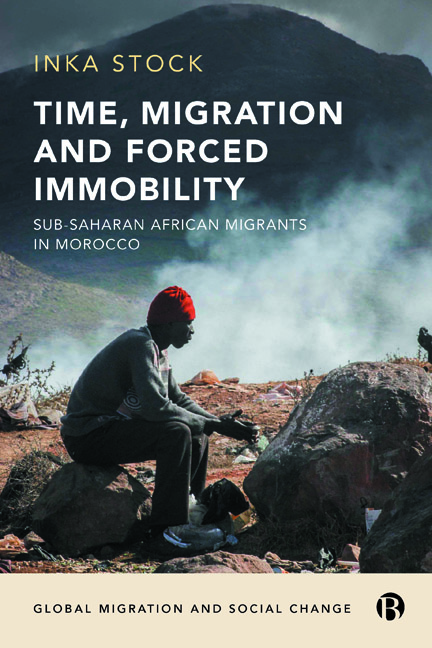Book contents
- Frontmatter
- Global Migration And Social Change
- Contents
- List of Figures and Tables
- Acknowledgements
- Series Preface
- 1 Introduction
- 2 EU Externalization Policies and their Impact on Migrants in Morocco
- 3 Travelling Adventures: Migration as an Existential Quest
- 4 Arriving in Morocco: Becoming Trapped in a Context of Uncertainty
- 5 Facing Time and the Absurd
- 6 Migrant Communities in Morocco
- 7 Waiting in Desperate Hope
- 8 Conclusion
- Bibliography
- Index
4 - Arriving in Morocco: Becoming Trapped in a Context of Uncertainty
Published online by Cambridge University Press: 30 April 2022
- Frontmatter
- Global Migration And Social Change
- Contents
- List of Figures and Tables
- Acknowledgements
- Series Preface
- 1 Introduction
- 2 EU Externalization Policies and their Impact on Migrants in Morocco
- 3 Travelling Adventures: Migration as an Existential Quest
- 4 Arriving in Morocco: Becoming Trapped in a Context of Uncertainty
- 5 Facing Time and the Absurd
- 6 Migrant Communities in Morocco
- 7 Waiting in Desperate Hope
- 8 Conclusion
- Bibliography
- Index
Summary
Introduction
While the previous chapter analysed how migrants navigate more or less successfully the multiple obstacles to mobility on their way to Europe and change who they are in the process, in this chapter, I demonstrate how migrants become increasingly unable to confront the particular powerful state mechanisms of migration control once they arrive in Morocco without documents. In order to do this, I am analysing the local consequences of national policy measures on migrants’ lives. I concentrate on describing how migrants are left in a sort of legal limbo in Morocco, from where they have no place from which to claim rights but are vulnerable to potential persecution and exploitation by both state and non-state actors. I compare the situation to Agamben's (1998) analysis of the state of exception in which migrants become effectively ‘non-persons’ before the law and are forced to live in the big cities, mostly in marginal positions in relation to the Moroccan host population.
As indicated in Chapter 2, the use of time and tempo in border control practices is part and parcel of modern-day migration governance in the European Union and in the US (see for example Haas 2017, Brux et al 2018). It is characterized by anticipatory action and deterrence, by real-time surveillance of territorial borders and the punishment of migrants through various forms of seized time (Anderson 2014, Tazzioli 2018). Many of these measures have been successfully exported into countries bordering the European Union, like Morocco. Biehl (2015) shows, for example how Turkey is using similar measures to discipline and control asylum seekers in its territory.
Rather than looking at time as a tool in migration control in order to shape where people are going, I focus in this chapter specifically on states’ uses of time as a tool to control how people are staying. That is, I am looking at the temporalities and tempos that come into play when people are seeking to incorporate themselves into the rhythms of society in meaningful ways (Cwerner 2001). For that to happen, people have to be able to predict action to a certain extent. This produces security and possibilities to anticipate dangers and risks as well as opportunities (Gasparini 2004).
- Type
- Chapter
- Information
- Time, Migration and Forced ImmobilitySub-Saharan African Migrants in Morocco, pp. 65 - 82Publisher: Bristol University PressPrint publication year: 2019



